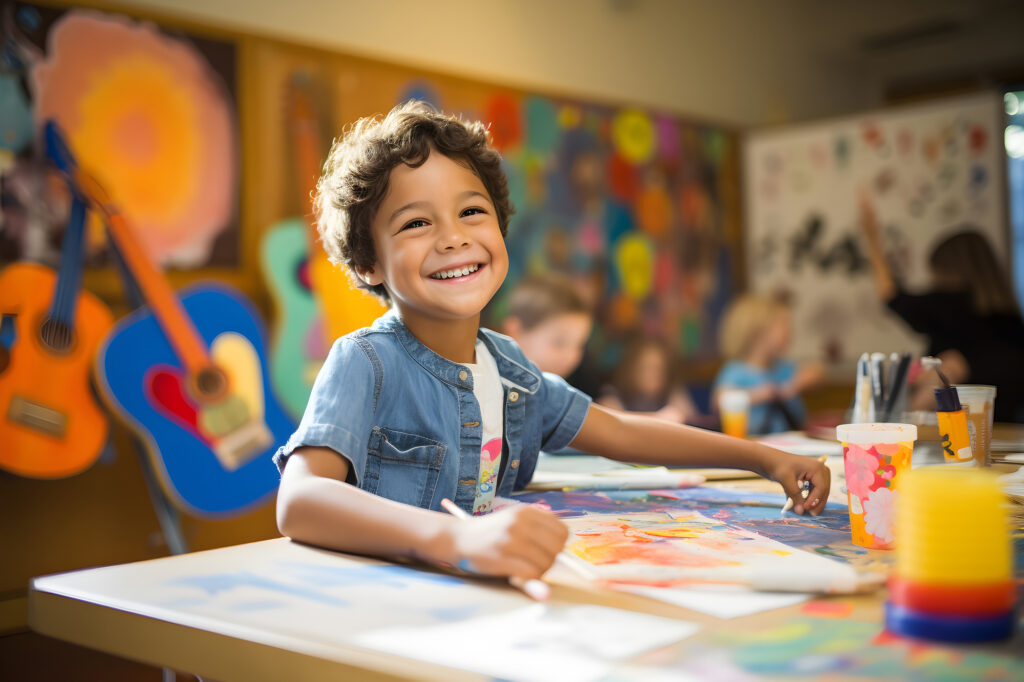One of the milestones children can accomplish is to be enrolled in a preschool. As per Statista, 72% of children in the world were in these institutions in 2022. It’s safe to say that many parents still believe in preschool’s vital role in molding a child’s discovery of the world and laying the foundation for growth and development.

Preschool fosters growth and development among children. Learn more about its importance in nurturing young minds in this blog.
Early childhood education provides children with a setting where they’re taught many developmental things. It’s fulfilling to see kids happily joining activities, feeling proud of their crafts, and enjoying the company of their classmates. Through playing and interacting, they develop their overall intelligence in many areas. So, it can’t be denied that preschool is crucial.
Continue reading as this article explores the importance of preschool for children.
Cognitive development: nurturing inquisitive minds
Cognitive development among children involves understanding ideas, reasoning their thoughts, and thinking about certain phenomena. Early childhood education plays a role in all this as this phase lays the groundwork for numeracy, literacy, speaking skills, and listening ability, among others. The exposure to numbers, letters, colors, and shapes also sharpens children’s capacity to comprehend.
The following are some of the cognitive development skills being honed in preschool:
- Questioning: This is the endless pursuit of children to ask ‘why’ about many things to know causes and effects. They also ask other questions to clarify scenarios.
- Problem-solving: As kids discover the world and unearth certain concepts about it, they tend to identify problems and find their way into investigating and solving them.
- Spatial relationships: During preschool years, children roam around all the time to inspect their physical environment. They also explore the spatial relationships surrounding them, such as a stuffed animal placed on a chair, inside a container, or under the table.
- Memory: Children start to notice the difference between people and objects. Also, they gradually build routines being taught to them.
- Imitation: One of the ways in which children learn behavior is by mimicking other people around them. For instance, kids see their parents putting their hands in their pockets when walking. Soon enough, they’d do the same thing as well.
All of these are honed when children go to preschool. These are also developed in them habitually because of the routine and structure each program provides. With consistency, these things will become a part of their system as they grow up.
Social and emotional growth: nurturing resilience and self-confidence
Preschool paves the way for children to grow their social and emotional skills. For one, this setup is one of the few instances wherein kids are apart from their guardians. It’s that phase in their lives where they feel like they’re the center of the world and have trouble putting themselves in other people’s shoes. That said, these learning spaces can help them develop peer relationships, learn to co-exist with people who aren’t their family members, take turns in activities, and coordinate with others.
Preschool also cultivates getting in touch with children’s emotions as they get to express what they feel in a safe environment. The various interactions equip them to be caring to others and cultivate relationships that will help them throughout their lives.
Being part of this learning environment helps them develop their social skills and regulates their emotions, which is crucial to their overall well-being. Given that they interact with their classmates, teachers, and other people they don’t live with, they get to learn how to think critically, make decisions independently, and act confidently. All of these can help prepare them for life.
Creativity and imagination: unleashing artistic potential
Young children are naturally creative and imaginative. Case in point, studies suggest that 65% of them most likely had imaginary companions before turning seven. And that’s just one of the many figments their playful minds can create.
Their curiosity leads them to a lot of discoveries that shape their inner reality. For instance, open-ended preschool activities like pretend play, building blocks, storytelling, and crafts nurture a sense of artistry that’d encourage them even more to broaden their horizons. Fostering a passion to learn and to grow is what all the activities in preschool are all about.
Imaginative play is also vital to the normal development of a child. It encourages children to express the way they see the world regardless of how things should be perceived. Seeing the world in their vision makes them think outside the box, which enables them to share their personality, thoughts, and uniqueness. Day in and day out of this process instills a sense of agency in them, developing a sense of belief in what they can do.
Not only that, but the exposure of children to diversity when it comes to cultures and practices creates in them the heart of an artist. Knowing that there are many different things to discover makes them keener when it comes to their artistic expression.
Conclusion
Preschool education’s holistic approach to learning helps children tap into the potential they have. This creates a lifestyle of learning, curiosity, creativity, and awareness that they’re part of a more extensive community beyond their family.
Moreover, preschool gives them an avenue to cultivate relationships with fellow kids and their teachers. These people can guide them in the phase they’re in. By putting them in the position of being taught and supported, children can grow up nurturing their minds, becoming confident in themselves, and unleashing their artistic potential.
Thank you,
Glenda Charlie and David Cates